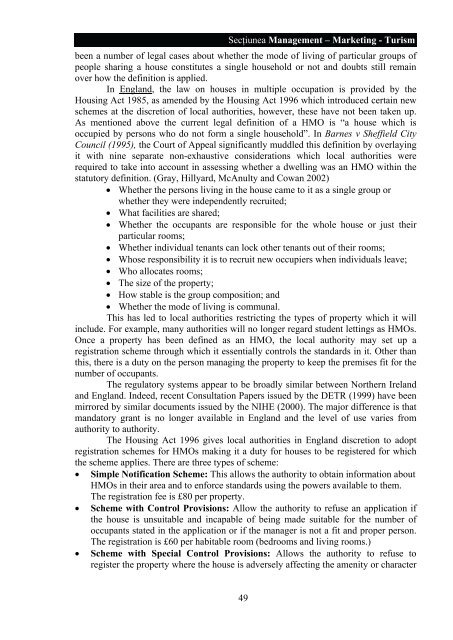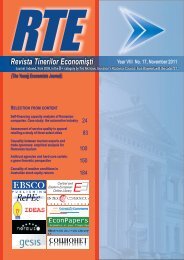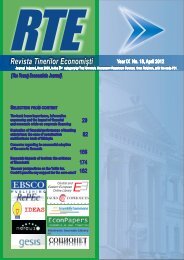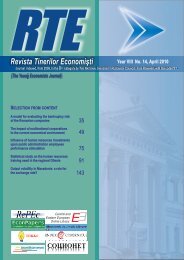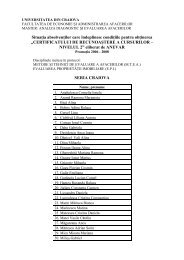Revista Tinerilor EconomiÅti - Centru E-learning de Instruire al ...
Revista Tinerilor EconomiÅti - Centru E-learning de Instruire al ...
Revista Tinerilor EconomiÅti - Centru E-learning de Instruire al ...
Create successful ePaper yourself
Turn your PDF publications into a flip-book with our unique Google optimized e-Paper software.
Secţiunea Management – Marketing - Turismbeen a number of leg<strong>al</strong> cases about whether the mo<strong>de</strong> of living of particular groups ofpeople sharing a house constitutes a single household or not and doubts still remainover how the <strong>de</strong>finition is applied.In England, the law on houses in multiple occupation is provi<strong>de</strong>d by theHousing Act 1985, as amen<strong>de</strong>d by the Housing Act 1996 which introduced certain newschemes at the discretion of loc<strong>al</strong> authorities, however, these have not been taken up.As mentioned above the current leg<strong>al</strong> <strong>de</strong>finition of a HMO is “a house which isoccupied by persons who do not form a single household”. In Barnes v Sheffield CityCouncil (1995), the Court of Appe<strong>al</strong> significantly muddled this <strong>de</strong>finition by overlayingit with nine separate non-exhaustive consi<strong>de</strong>rations which loc<strong>al</strong> authorities wererequired to take into account in assessing whether a dwelling was an HMO within thestatutory <strong>de</strong>finition. (Gray, Hillyard, McAnulty and Cowan 2002)• Whether the persons living in the house came to it as a single group orwhether they were in<strong>de</strong>pen<strong>de</strong>ntly recruited;• What facilities are shared;• Whether the occupants are responsible for the whole house or just theirparticular rooms;• Whether individu<strong>al</strong> tenants can lock other tenants out of their rooms;• Whose responsibility it is to recruit new occupiers when individu<strong>al</strong>s leave;• Who <strong>al</strong>locates rooms;• The size of the property;• How stable is the group composition; and• Whether the mo<strong>de</strong> of living is commun<strong>al</strong>.This has led to loc<strong>al</strong> authorities restricting the types of property which it willinclu<strong>de</strong>. For example, many authorities will no longer regard stu<strong>de</strong>nt lettings as HMOs.Once a property has been <strong>de</strong>fined as an HMO, the loc<strong>al</strong> authority may set up aregistration scheme through which it essenti<strong>al</strong>ly controls the standards in it. Other thanthis, there is a duty on the person managing the property to keep the premises fit for thenumber of occupants.The regulatory systems appear to be broadly similar between Northern Irelandand England. In<strong>de</strong>ed, recent Consultation Papers issued by the DETR (1999) have beenmirrored by similar documents issued by the NIHE (2000). The major difference is thatmandatory grant is no longer available in England and the level of use varies fromauthority to authority.The Housing Act 1996 gives loc<strong>al</strong> authorities in England discretion to adoptregistration schemes for HMOs making it a duty for houses to be registered for whichthe scheme applies. There are three types of scheme:• Simple Notification Scheme: This <strong>al</strong>lows the authority to obtain information aboutHMOs in their area and to enforce standards using the powers available to them.The registration fee is £80 per property.• Scheme with Control Provisions: Allow the authority to refuse an application ifthe house is unsuitable and incapable of being ma<strong>de</strong> suitable for the number ofoccupants stated in the application or if the manager is not a fit and proper person.The registration is £60 per habitable room (bedrooms and living rooms.)• Scheme with Speci<strong>al</strong> Control Provisions: Allows the authority to refuse toregister the property where the house is adversely affecting the amenity or character49


